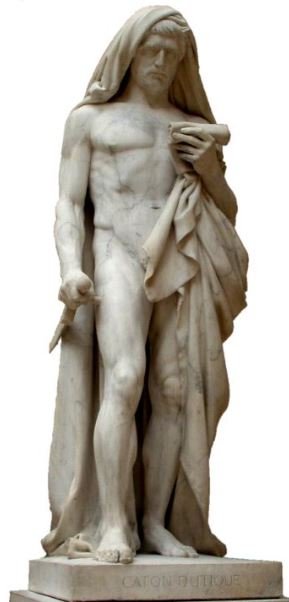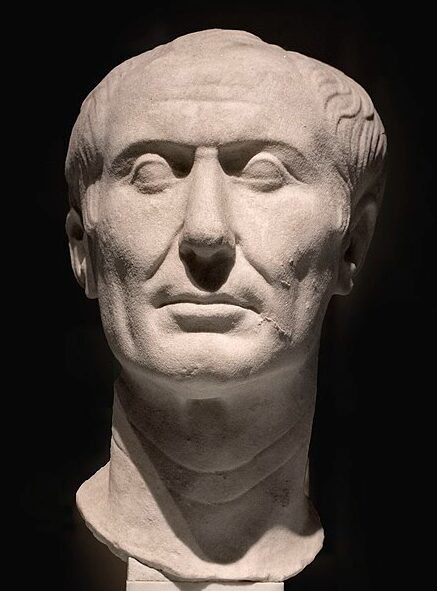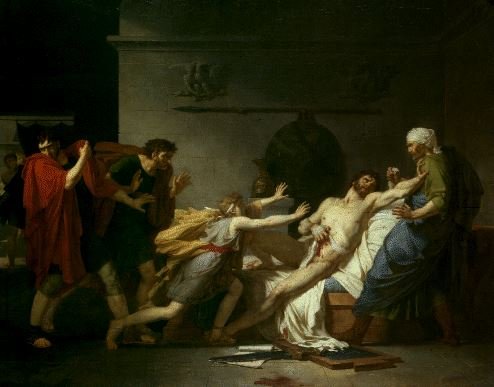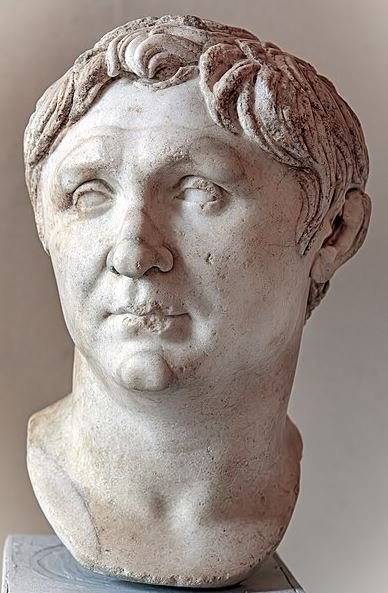Cato the Younger: Life and Major Accomplishments
Marcus Porcius Cato Uticensis, commonly known as Cato the Younger (95 BC – April 46 BC), was a Roman politician, military leader, and Stoic philosopher whose life spanned one of the most tumultuous periods of Roman history, leading up to the fall of the Roman Republic.
Renowned for his unwavering moral integrity, dedication to Roman traditions, and unyielding opposition to the rise of autocratic rule, Cato’s life and career are often seen as symbolic of the struggle between Republican values and the eventual shift towards empire under Julius Caesar.
His character and actions left an indelible mark on Roman politics, earning him a place among the most revered, and at times controversial, figures of the late Republic.
READ MORE: Most Famous Stoic Philosophers of the Ancient World
Early Life and Background
Cato was born in 95 BC into a family with a rich political and military heritage. He was the great-grandson of Marcus Porcius Cato, known as Cato the Elder, a revered Roman statesman famous for his strict adherence to Roman morality, simplicity, and his relentless advocacy for traditional Roman values. This familial connection significantly influenced Cato the Younger’s outlook, instilling in him a sense of duty to uphold the principles of the Roman Republic.
Orphaned at an early age, Cato was raised by his maternal uncle, Marcus Livius Drusus, a noted reformer. His early education focused on the values of Stoicism, a philosophy that emphasized self-discipline, virtue, and rational thought, ideals that Cato would carry throughout his life. Cato’s rigorous Stoic beliefs shaped his public and private life, as he became famous for his personal austerity, moral uprightness, and disdain for luxury and corruption.

Image: A statue of Cato at the Louvre Museum in France.
Early Political Career
Cato entered the public sphere at a time when Rome was embroiled in political chaos, marked by growing tensions between the Senate, populist politicians, and military leaders who sought to expand their personal power. His early political career was characterized by his fierce defense of Roman Republican values and his opposition to what he saw as the erosion of traditional Roman governance.
In 63 BC, Cato was elected to the position of quaestor, a role responsible for overseeing Rome’s finances. His time as quaestor gained him widespread admiration for his honesty, transparency, and determination to root out corruption. Cato took the unusual step of thoroughly investigating previous financial records to ensure that no malfeasance had occurred, an action that set him apart from many of his contemporaries. His scrupulousness in handling Rome’s finances established his reputation as an incorruptible and principled public servant.
Cato also played a significant role during the Catilinarian Conspiracy of 63 BC, a plot led by Lucius Sergius Catilina (Catiline) to overthrow the Roman government. While many politicians sought to use the conspiracy for personal gain, Cato took a hardline stance, demanding that the conspirators face execution without trial, a position aligned with his belief in upholding the Republic’s legal framework and preventing any further destabilization. His actions during this period further cemented his status as a defender of the Republic.
The Tribunate and Opposition to Caesar
In 62 BC, Cato was elected tribune of the plebs, a powerful position that allowed him to introduce legislation and protect the interests of the Roman people. During his tribunate, Cato introduced several measures aimed at reinforcing traditional Roman values and curbing the growing influence of ambitious military leaders.
One of his most notable actions during this period was his opposition to Roman general Pompey the Great’s political ambitions. Pompey, one of Rome’s most successful generals, sought extraordinary powers upon his return from military campaigns in the East. Cato viewed Pompey’s aspirations as a direct threat to the Republican system, as he believed no single individual should hold too much power. Cato’s successful efforts to block legislation that would have given Pompey greater military command frustrated the general’s ambitions and established Cato as a formidable opponent of populist military leaders.
Cato’s most famous political rivalry, however, was with Julius Caesar. During Caesar’s first consulship in 59 BC, Cato vehemently opposed many of Caesar’s reform measures, viewing them as thinly veiled attempts to amass personal power and undermine the authority of the Senate. Cato’s resistance included vocal opposition to Caesar’s land reforms and other populist measures designed to curry favor with the masses.
As Caesar’s influence grew, Cato became one of his most persistent adversaries, rallying the Senate to oppose Caesar’s attempts to extend his military command in Gaul. Despite these efforts, Caesar’s popularity among the Roman people and military ensured that he continued to gain power, but Cato’s opposition symbolized the Senate’s ongoing struggle to maintain control in the face of rising populist leaders.
The First Triumvirate and Growing Tensions
In response to the increasing opposition from the Senate, Julius Caesar, Pompey, and Marcus Licinius Crassus formed an unofficial political alliance known as the First Triumvirate in 60 BC. This alliance was designed to bypass the Senate and ensure that each of the three men could pursue their political ambitions with minimal interference. Cato, seeing this as a dangerous consolidation of power, became one of the most vocal critics of the Triumvirate.
Cato’s opposition to the Triumvirate was rooted in his belief that such alliances violated the core principles of the Republic, which required a balance of power among various institutions and individuals. He continued to work tirelessly to obstruct the political goals of Caesar, Pompey, and Crassus, although his efforts were often thwarted by the immense popularity and influence of the Triumvirs.
Despite his opposition to Pompey, Cato eventually supported Pompey’s sole consulship in 52 BC. This move was a pragmatic attempt to distance Pompey from his alliance with Caesar and strengthen the Senate’s position. However, tensions between Caesar and the Senate escalated, and Cato’s hardline stance contributed to the growing political instability that would eventually lead to civil war.
Caesar’s Civil War and Cato’s Role
By January 49 BC, the growing tensions between Julius Caesar and the Senate reached a boiling point, resulting in Caesar crossing the Rubicon River with his army, an act of rebellion that sparked a civil war. Cato, aligning himself with Pompey and the Senatorial faction, fought to preserve the Republic and resist Caesar’s consolidation of power.
Throughout the civil war, Cato remained steadfast in his commitment to Republican ideals, even as Caesar’s forces won decisive victories. Cato joined Pompey’s forces and took on leadership roles, including commanding garrisons and overseeing military operations. Despite his efforts, Caesar’s forces ultimately defeated Pompey’s army at the Battle of Pharsalus in 48 BC, forcing Pompey to flee to Egypt, where he was assassinated.
After Pompey’s death, Cato continued to resist Caesar, retreating to Africa, where he helped organize the remaining Republican forces. In 46 BC, following Caesar’s victory in the Battle of Thapsus, Cato found himself in Utica, a city in North Africa, with no realistic hope of defeating Caesar’s forces. Rather than surrender and accept Caesar’s pardon, which had been offered to other prominent Republicans, Cato chose to take his own life, an act that transformed him into a martyr for the Republican cause.
Cato’s suicide was a carefully staged event that reflected his Stoic beliefs. He spent the evening reading Plato’s Phaedo, a dialogue on the immortality of the soul, before stabbing himself with his sword. When the wound was not immediately fatal, Cato, undeterred, tore it open to ensure his death. His death was seen by many contemporaries as the ultimate act of defiance against tyranny, and it solidified his legacy as a symbol of the dying Roman Republic.

Image: The head of Julius Caesar.
Cato’s Legacy and Impact
Cato’s life and death had a profound impact on Roman politics and later historical interpretations of the fall of the Republic. For his contemporaries, Cato became a symbol of unwavering moral integrity, a man who valued the principles of the Republic over personal gain or survival. His Stoic philosophy, which emphasized duty, virtue, and rationality, shaped his approach to governance and his public life, earning him admiration from both allies and opponents.
Cato’s actions, however, were not without criticism. Some of his contemporaries and later historians have argued that his rigid adherence to Republican ideals and his refusal to compromise contributed to the downfall of the very system he sought to preserve. By refusing to adapt to the changing political realities of Rome and consistently opposing powerful figures like Caesar and Pompey, Cato may have inadvertently hastened the Republic’s collapse by fostering division and conflict.
Despite these criticisms, Cato’s legacy endured long after his death. He was admired by later philosophers, particularly those influenced by Stoicism, for his moral fortitude and his willingness to die for his principles. Cato’s life became a point of reference for political thinkers throughout history, who debated the virtues and flaws of his unwavering commitment to Republican ideals.
The Roman poet Lucan, in his epic poem Pharsalia, portrayed Cato as the last true Roman, a man who stood against tyranny even in the face of certain defeat. This portrayal of Cato as a martyr for liberty and Republican governance resonated throughout the centuries, influencing political thought in both the Renaissance and the Enlightenment.
One of the most famous admirers of Cato was the American Founding Father George Washington, who famously had Joseph Addison’s play Cato, a Tragedy performed for his troops at Valley Forge during the American Revolution. The play depicted Cato as a hero of Republican virtue and a symbol of resistance against tyranny, qualities that Washington sought to embody during the struggle for American independence.
Personal Life and Stoic Beliefs
Cato’s personal life was closely intertwined with his public persona as a man of unshakable virtue, discipline, and Stoic beliefs. His adherence to the Stoic philosophy, which emphasized rational thought, self-control, and living in harmony with nature, shaped both his personal and political actions. Stoicism taught that emotions should not dictate one’s decisions and that virtue was the highest good, a worldview that Cato embodied throughout his life.
Cato was famous for his personal austerity. He deliberately lived in a manner that contrasted with the extravagance and luxury of many of his contemporaries. He wore simple clothes, walked barefoot in public, and avoided the ostentatious displays of wealth and power that were common among Rome’s elite. His lifestyle was intended to reflect the Stoic ideal of living according to nature and reason, free from the corrupting influence of material desires. In public life, this moral rigor made Cato both respected and, at times, resented by his peers.
Cato’s personal relationships were also shaped by his Stoic beliefs. He married Marcia, the daughter of Lucius Marcius Philippus, in a union that was as much a matter of political alliance as personal connection. However, he famously allowed Marcia to divorce him so she could marry his friend and political ally, Quintus Hortensius, who wished to have children. This unusual arrangement, which reflected Cato’s Stoic detachment from emotional entanglements, caused scandal at the time, but Cato’s reasons for permitting the divorce were in line with his philosophical beliefs about duty and the importance of friendship.
Cato was also deeply devoted to his family and was known for his love and care for his children. His son, Marcus Porcius Cato, and his daughter, Porcia, both inherited their father’s Stoic ideals and carried on his legacy of resistance to autocratic rule. Porcia, in particular, became famous for her courage and philosophical dedication. She was married to Marcus Junius Brutus, one of the leading assassins of Julius Caesar, and was a staunch supporter of the Republican cause. After Brutus’ defeat and suicide following the Battle of Philippi, Porcia is believed to have taken her own life, reportedly swallowing hot coals, in a dramatic act of Stoic resolve that mirrored her father’s determination to die for his principles.
Cato and Stoicism in Political Life
Cato’s Stoicism was not merely a personal belief system but a political stance. He believed that the principles of Stoicism were directly applicable to governance, and that rulers and public officials should live virtuously, free from corruption, greed, or the pursuit of personal gain. His actions in the Roman Senate reflected this philosophy. Cato was known for his unwavering honesty, and he consistently advocated for policies that prioritized the public good over private interests.
During his time in public office, Cato frequently spoke out against the accumulation of wealth and power by Rome’s military leaders. He believed that the Republic was endangered by individuals like Pompey and Caesar, who sought to use their military victories to gain political control. Cato’s vision for Rome was one in which the Senate, as the representative body of the Roman people, maintained authority, and where military leaders remained accountable to civil government. This was a central reason behind his relentless opposition to Caesar’s rise to power.
Cato’s devotion to his Stoic principles often made him uncompromising in political matters. While this won him the admiration of many who viewed him as the last defender of Republican values, it also led to criticism. His unwillingness to negotiate or adapt to changing political circumstances may have alienated potential allies and, some argue, contributed to the collapse of the Republic he sought to preserve. Nevertheless, Cato’s moral integrity and his refusal to back down in the face of overwhelming odds cemented his reputation as one of the most principled figures in Roman history.
Cato’s Death and Its Symbolism
Cato’s suicide in 46 BC is perhaps the most defining moment of his life, and it has been interpreted by many as a symbolic act of defiance against tyranny. By taking his own life rather than accepting Caesar’s clemency, Cato sent a powerful message: he would rather die than live under the rule of a dictator, even one as forgiving as Caesar.
His death was meticulously planned to convey his philosophical beliefs. On the night of his suicide, Cato read Plato’s Phaedo, a dialogue on the immortality of the soul and the philosophical justification for choosing death over dishonor. This act was a clear statement of Cato’s commitment to Stoic ideals. He believed that to live under Caesar’s rule would be a betrayal of the Republic and the values he had spent his life defending.
Cato’s death had far-reaching consequences. His refusal to live in what he saw as a morally compromised world transformed him into a martyr for the Republican cause. For many Romans, Cato’s suicide became a symbol of the Republic’s death, and his legacy inspired future generations of political thinkers and leaders who admired his steadfastness and refusal to compromise.

Image: A drawing depicting Cato’s demise.
Cato’s Influence on Later Generations
Cato’s influence extended beyond his lifetime, shaping philosophical and political thought for centuries to come. In the Roman Empire, Stoicism continued to be a dominant philosophical school, and Cato’s life became an ideal for later Stoic philosophers. His commitment to virtue and his rejection of tyranny were frequently cited as exemplars of moral conduct.
In the Middle Ages and the Renaissance, Cato’s reputation as a defender of liberty was revived by scholars who viewed his life as a model for virtuous leadership. The Stoic emphasis on duty, morality, and rationality found resonance in this period, particularly among humanists who sought to revive Classical ideals.
One of the most significant revivals of Cato’s legacy occurred during the Enlightenment. In this period, Cato was hailed as a symbol of republicanism and resistance to tyranny. Political thinkers in Europe and America, grappling with issues of liberty, governance, and the role of individual virtue in public life, often invoked Cato’s name as a model of republican virtue.
The play Cato, a Tragedy, written by Joseph Addison in 1712, became particularly influential. The play’s portrayal of Cato as a hero of liberty who chooses death over the loss of freedom struck a chord with audiences, particularly in the American colonies, where it became a rallying cry for the Revolutionary cause. George Washington had the play performed for his troops during the winter at Valley Forge, and its themes of personal sacrifice, resistance to tyranny, and the defense of republican ideals resonated with the Founding Fathers. Cato’s legacy helped shape the ideological foundation of the American Revolution, and his example continues to be studied and admired by those who value republicanism and personal integrity.
Conclusion
Cato the Younger’s life was one of unwavering commitment to the ideals of the Roman Republic. His Stoic beliefs shaped both his personal conduct and his public career, leading him to become a symbol of integrity and resistance to tyranny. While his refusal to compromise may have contributed to the downfall of the Republic, Cato’s legacy as a martyr for liberty and as a defender of republican values has endured throughout history.
His life and death inspired generations of thinkers, philosophers, and political leaders, from the Roman Empire to the American Revolution. In a world that was rapidly changing, Cato’s steadfast dedication to tradition and virtue made him both a revered and controversial figure. His name continues to evoke ideas of moral fortitude, resistance to authoritarianism, and the enduring struggle to uphold principles in the face of overwhelming opposition.
The last king of Rome before the establishment of the Roman Republic
Frequently Asked Questions

What qualities made Cato the Younger influential in Roman politics?
Cato was known for his honesty, incorruptibility, and respect for Roman traditions. His scrupulous character gave him considerable political influence, which he used to oppose powerful figures like Julius Caesar and Pompey.
What political offices did Cato hold before Caesar’s civil war?
Cato served as urban quaestor in 63 BC, tribune in 62 BC, and praetor in 54 BC. His tenure as quaestor was particularly noted for his integrity in managing Rome’s finances.
What laws did Cato pass during his tribunate in 62 BC?
During his tribunate, Cato expanded the grain dole and passed laws requiring generals to give up their armies before running for office.
How did Cato oppose Pompey and Caesar before the civil war?
Cato opposed Pompey’s bid for military command during the Catilinarian Conspiracy and resisted Caesar’s legislative agenda during Caesar’s first consulship in 59 BC. He later supported Pompey’s sole consulship in 52 BC to weaken Pompey’s alliance with Caesar.

Image: A statue of Pompey’s head.
What was Cato’s approach during Caesar’s civil war?
Cato joined Pompey’s side but sought to minimize bloodshed during the war. After Pompey’s defeat, Cato chose suicide rather than accept Caesar’s pardon, making him a symbol of the Republic’s cause.
Why is Cato the Younger often viewed as a martyr for the Roman Republic?
Cato’s suicide after Pompey’s defeat transformed him into a martyr for the Republic, as he chose death over submission to Caesar, symbolizing his unyielding dedication to Roman republican ideals.
Why has Cato’s opposition to Caesar and Pompey been criticized?
Cato’s uncompromising stance against powerful generals like Caesar and Pompey is seen by some as contributing to the political instability that led to the formation of the First Triumvirate and the outbreak of civil war.
How does Cato the Younger’s legacy compare to that of his great-grandfather, Cato the Elder?
Like Cato the Elder, Cato the Younger is remembered as a model of Roman virtue and tradition, admired for his moralist principles and his staunch defense of the Republic.
What impact did Cato’s actions have on the late Roman Republic?
Cato’s actions, though rooted in his desire to preserve traditional Roman values, contributed to the political tensions that led to civil war and the eventual collapse of the Roman Republic.
READ MORE: Most Famous Roman Generals and their Accomplishments



























